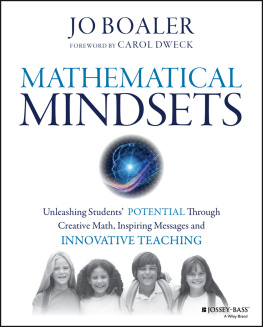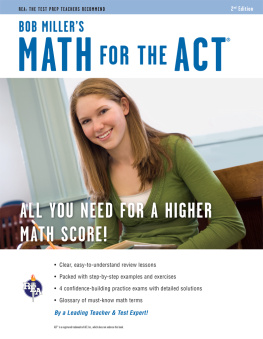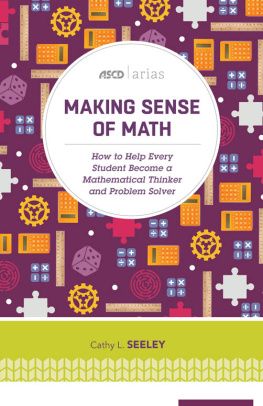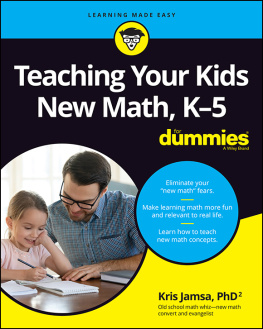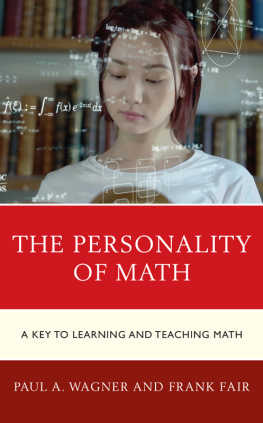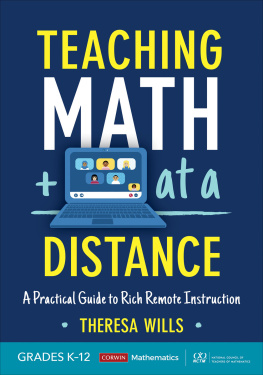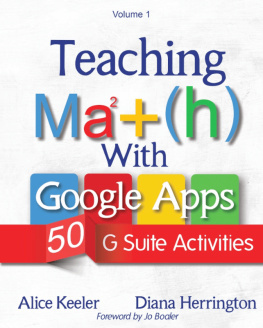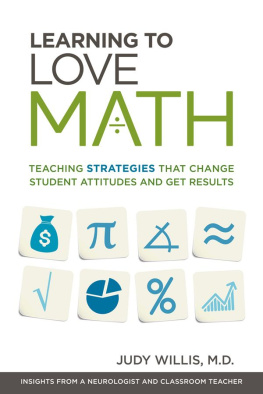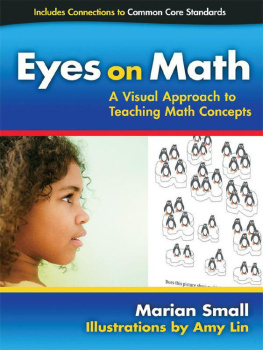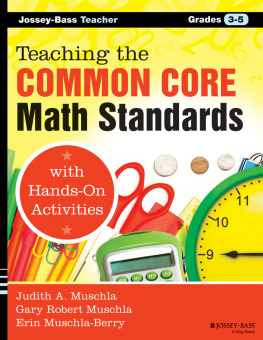
Copyright 2016 by Jo Boaler. All rights reserved.
Published by Jossey-Bass
A Wiley Brand
One Montgomery Street, Suite 1000, San Francisco, CA 94104-4594www.josseybass.com
No part of this publication may be reproduced, stored in a retrieval system, or transmitted in any form or by any means, electronic, mechanical, photocopying, recording, scanning, or otherwise, except as permitted under Section 107 or 108 of the 1976 United States Copyright Act, without either the prior written permission of the publisher, or authorization through payment of the appropriate per-copy fee to the Copyright Clearance Center, Inc., 222 Rosewood Drive, Danvers, MA 01923, 978-750-8400, fax 978-646-8600, or on the Web at www.copyright.com. Requests to the publisher for permission should be addressed to the Permissions Department, John Wiley & Sons, Inc., 111 River Street, Hoboken, NJ 07030, 201-748-6011, fax 201-748-6008, or online at www.wiley.com/go/permissions.
Limit of Liability/Disclaimer of Warranty: While the publisher and author have used their best efforts in preparing this book, they make no representations or warranties with respect to the accuracy or completeness of the contents of this book and specifically disclaim any implied warranties of merchantability or fitness for a particular purpose. No warranty may be created or extended by sales representatives or written sales materials. The advice and strategies contained herein may not be suitable for your situation. You should consult with a professional where appropriate. Neither the publisher nor author shall be liable for any loss of profit or any other commercial damages, including but not limited to special, incidental, consequential, or other damages. Readers should be aware that Internet Web sites offered as citations and/or sources for further information may have changed or disappeared between the time this was written and when it is read.
Certain pages from this book are designed for use in a group setting and may be customized and reproduced for educational/training purposes. The reproducible pages are designated by the appearance of the following copyright notice at the foot of each page:
Mathematical Mindsets. Copyright 2016 by Jo Boaler.
Reproduced by permission of John Wiley and Sons, Inc.
This notice may not be changed or deleted and it must appear on all reproductions as printed. This free permission is restricted to the paper reproduction of the materials for educational/training events. It does not allow for systematic or large-scale reproduction, distribution (more than 100 copies per page, per year), transmission, electronic reproduction or inclusion in any publications offered for sale or used for commercial purposes-none of which may be done without prior written permission of the Publisher.
Jossey-Bass books and products are available through most bookstores. To contact Jossey-Bass directly call our Customer Care Department within the U.S. at 800-956-7739, outside the U.S. at 317-572-3986, or fax 317-572-4002.
Wiley publishes in a variety of print and electronic formats and by print-on-demand. Some material included with standard print versions of this book may not be included in e-books or in print-on-demand. If this book refers to media such as a CD or DVD that is not included in the version you purchased, you may download this material at http://booksupport.wiley.com. For more information about Wiley products, visit www.wiley.com.
Library of Congress Cataloging-in-Publication Data
Boaler, Jo, 1964
Mathematical mindsets : unleashing students' potential through creative math, inspiring messages, and innovative teaching / Jo Boaler.
1 online resource.
A Wiley brand.
Includes bibliographical references and index.
Description based on print version record and CIP data provided by publisher; resource not viewed.
ISBN 978-1-118-41827-7 (pdf) ISBN 978-1-118-41553-5 (epub) ISBN 978-0-470-89452-1 (pbk.)
1. MathematicsStudy and teaching (Middle school) 2. MathematicsStudy and teaching (Secondary) I. Title.
QA135.6
510.712dc23
2015031316
Cover Design: Wiley
Cover Image: Illustration agsandrew/Shutterstock; Schoolchildren monkeybusinessimages/iStockphoto.com
FIRST EDITION
Foreword
One of my former Stanford students teaches fourth grade in the South Bronx, an area of New York City with many underserved, underachieving minority students. Her students invariably believe they are bad at math, and if you looked at their past performance, you might be tempted to think so too. And yet, after one year in her class, her fourth graders became the #1 fourth-grade class in the state of New York: 100% of them passed the state math test, with 90% of them earning the top score. And this is just one of many examples of how all students can learn math.
When people think that some kids just can't do math, that success in math is reserved for only certain kids, thought of as smart, or that it's just too late for kids who haven't had the right background, then they can easily accept that many students fail math and hate math. In fact, we have found that many teachers actually console their students by telling them not to worry about doing poorly in math because not everyone can excel in it. These adult enablersparents and teachers alikeallow kids to give up on math before they've barely gotten started. No wonder more than a few students simply dismiss their own poor performance by declaring: I'm not a math person.
Where do parents, teachers, and students get the idea that math is just for some people? New research shows that this idea is deeply embedded in the field of mathematics. Researchers polled scholars (at American universities) in a range of disciplines. They asked them how much they thought that success in their field depended on fixed, innate ability that cannot be taught, as opposed to hard work, dedication, and learning. Of all the STEM fields (science, technology, engineering, and math), math scholars were the most extreme in emphasizing fixed, innate ability (Leslie, Cimpian, Meyer, & Freeland, 2015). Other researchers are finding that many math instructors begin their courses by referring to students who have the aptitude and those who do not. One college instructor, on the first day of an introductory college course, was heard to say, If it's not easy for you, you don't belong here (Murphy, Garcia, & Zirkel, in prep). If this message is passed down from generation to generation, no wonder students are afraid of math. And no wonder they conclude they're not math people when it doesn't come easily.
But when we begin to see evidence that most students (and maybe almost all students) are capable of excelling in and enjoying math, as the following chapters show, it is no longer acceptable that so many students fail math and hate math. So what can we do to make math learning happen for all students? How can we help teachers and children believe that math ability can be developed, and then show teachers how to teach math in a way that brings this belief to life? That's what this book is about.
In this unique and wonderful book, Jo Boaler distills her years of experience and her powerful wisdom to show teachers exactly how to present math work, structure math problems, guide students through them, and give feedback in a way that helps students toward a growth mindset and keeps them there. Boaler is one of those rare and remarkable educators who not only know the secret of great teaching but also know how to give that gift to others. Thousands of teachers have learned from her, and here's what they say:
Throughout my schooling years I was left feeling stupid and incapable of doing [math] I cannot tell you the relief I now have that I can learn math myself, and I can teach students that they can too.
Next page
